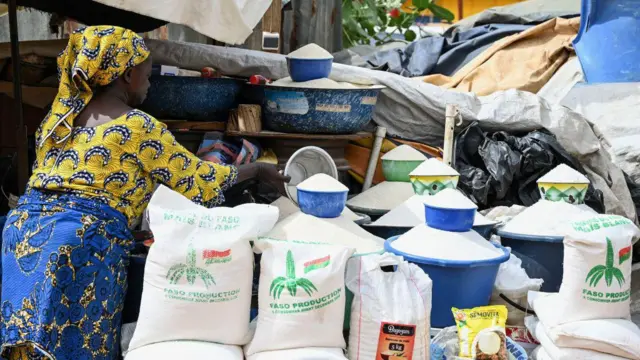At Niamey’s bustling Wadata market, Rakia Abdou, a mother of five, negotiates fiercely for a sack of rice. For many in Niger, basic staples like rice are becoming unaffordable due to inflation, which remains a pressing challenge in the aftermath of regional sanctions and ongoing supply chain disruptions.
Though prices of local foods have stabilized, imported goods remain expensive, creating daily struggles for Niger’s 26 million inhabitants. Nearly a year has passed since the Economic Community of West African States (ECOWAS) lifted sanctions imposed in response to the 2023 military coup that ousted President Mohamed Bazoum. Yet, the country still feels the lingering effects, with inflation peaking at a record 15.5% in June last year before easing slightly. Despite this, projections from the World Bank suggest inflation will remain elevated at 5.4% through 2025-2026.
The sanctions had a profound impact, disrupting supply chains and inflating the cost of essentials. Economist Abdallah Souleymane noted that restricted imports led to widespread difficulties, particularly in accessing affordable food.
Border Closures and Expensive Detours
A major contributor to high costs is the ongoing closure of Niger’s border with Benin. Previously, 80% of Niger’s imports came through Benin’s ports, but tensions over accusations of harboring jihadist camps have severed this crucial trade route. While Benin denies the allegations, Niger now relies on Togo’s port in Lomé, a far longer and more dangerous route.
Truck drivers transporting goods face grueling journeys, navigating jihadist-plagued regions in Burkina Faso. Ghanaian driver Idrissou Issoufou described these trips as “ordeals,” with delays lasting two to three months and heightened risks despite military escorts. These challenges inflate transportation costs, which are passed on to consumers.
Some goods still manage to cross the Niger River from Benin, but this workaround is expensive and inefficient. Salamatou Gna, a Beninese trader, lamented the steep costs of river transport, which further strain traders and customers alike.
Adapting to a New Normal
For many Nigeriens, adapting to these economic hardships means revising their lifestyles and eating habits. At local markets, residents report spending the same amount on groceries but returning home with fewer items. “It’s no longer about preparing two large meals a day,” one shopper noted.
Traditional dishes made from local products, like cornmeal, have replaced pricier imported foods for many families. Consumer advocate Mahaman Nouri emphasized the necessity of embracing local alternatives, as imports become less viable.
Government Measures and Economic Resilience
To mitigate the impact of inflation and sanctions, Niger’s military-led government has implemented various relief measures. These include halving the cost of medical consultations and treatments, cutting prices on petrol, diesel, and cement, and reducing customs duties. Authorities have also distributed free food to vulnerable populations and sold grains at subsidized prices.
The government has restricted cereal exports, particularly to Nigeria, to prevent local shortages and ensure food security. These efforts have helped Niger’s economy demonstrate resilience, with salaries for public sector workers being maintained despite the challenges.
The World Bank, which has resumed aid to Niger, projects an average GDP growth rate of 6.5% for 2025-2026, driven by agriculture and oil exports. However, persistent inflation threatens this progress, with nearly half of Niger’s population at risk of falling into extreme poverty if conditions do not improve.
A Fragile Road Ahead
Niger faces a delicate balance between economic recovery and the ongoing struggles of its population. While government measures provide temporary relief, long-term solutions will require addressing the root causes of inflation and improving supply chain stability. For now, Nigeriens continue to adapt to an uncertain and challenging economic landscape, holding onto hope for a more stable future.



